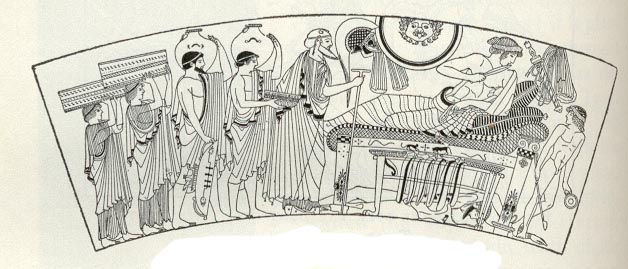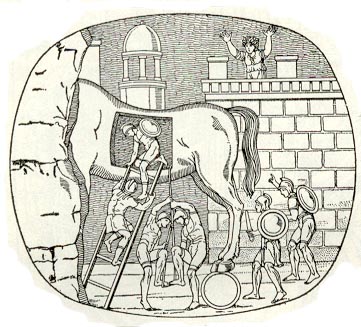Masterpieces of Western Literature
| Unit 3 |
|
English
201:
Masterpieces of Western Literature |
| .Unit 3 Reading | Course Reading | Entry Page |
| Introduction | Background | .Explication | Questions | Review |
Review:
You witnessed the inescapable truth about human life: that no matter how glorious, it ends.
No doubt, you found AK’s treatment of HK’s corpse disgusting:1.The problem with an unconditional dedication to power is injustice (dike).
Apollo charges that:
24.46Murderous
AK has your [the Olympians] willing help--
........a
man who shows no decency, implacable,
.......barbarous
in his ways as a wild lion
Hera answers:
24.67 Lord
of the silver bow, your words would be
........acceptable
if one had a mind to honor
........HK
& AK equally.
........But
KH suckled at a woman’s breast,
........AK
is the first-born of a goddess
This seems to be a horrific inversion.HK is the moral champion, the very person of virtue.AK is a baby, a narcissist who is alternatively awesome & contemptible.How can Hera defend AK over HK?We need to perform two operations to find the answer.First, what does each character personify?AK personifies power.HK personifies virtue.Which is more fundamental?If we could choose only one (like Paris), which would we choose?The world of the Iliad illustrates the results of unconditionally choosing power regardless of any other consideration.The second operation asks whether or not you wish to live in such a world?The heroic world is awesome, stark, & alluring.The cost of giving in to that allurement (Helen) is that you give up the (reasonable) right to object that it is injust; that there is an unbridgeable gap between the divinities & humankind, between aristocratic warriors & everyone else.If power is the only value, the answer is a sneer.Was it president Nixon who said, “let them twist in the wind”?Aeschylus ends his first play about AG with Klytemnestra sneering comment about those who want justice: “let them howl—they’re impotent.You [Aegisthus] & I have power now” (p. 663).
This point is made by Priam when he impotently rages at his remaining, cowardly sons:2.Power consumes every virtue, every value other than itself.
An unconditional commitment to power engages the best men (best in the sense of power) in battles without victors.The victor who prevails in one battle must meet others & still others.The result is that the best citizens come to the fore in defense of civilization & are consumed, leaving the cowardly rats & cockroaches & lords of the dance to inherit what they gave their lives to defend.The only way out of this collapse is to acknowledge that there must be values, in addition to power, that we should be committed to.
This point is illustrated by the weeping scene involving Priam & AK.These 2 are the victors.HK could barely stand before the awesome & terrifying AK.It is laughable to think that anyone among the lords of the dance could face HK.The fact that Apollo uses Paris to destroy AK, as though by accident, is no victory.It is as though Gen. Eisenhower was hit by a bus crossing a street.What would that illustrate?3.When everyone is unconditionally committed to nothing but power, success is grief.

I don’t see any change.Two points
resist the idea of a fundamental reorientation of values.“New
longing” seems to me to imply a new object for the same old emotional circuit.Just
as the loss of Briseis was replaced by the “new longing” of loss for PAT;
or rage at AG replaced by HK; here the grief for PAT (really AK’s self-pity
at not being able to affect fate & escape his own mortality), is temporarily replaced
by grief for his father. It is simply another emotional indulgence in a
life of similarly sweeping & deep emotion.Secondly,
isn’t it interesting that Homer characterizes Priam as weeping for “HK,
killer of men.”What of all the
men HK killed?Sure we can say that
he was nobly defending the city against savage force.But
those men had wives & children.Remember
Diomedes saying, “we came here under god” (9.58)?
Violence & power that has
overcome ever obstacle, & perhaps, every principle, does not glory
in its own victory.It weeps at its
own success, having cynically proved that there is no reality but power
& death.
Each generation of the polis is a link in the chain of civilization.If a single link in the chain is broken, the temporal chain of cultural heritage is irremediably ruptured. This happened to great civilizations in Egypt, in Meso-America, in Africa (to Carthage & perhaps to sub-Saharan cultures).This tragedy is voiced by AND:4. A single loss means totally erasure.
The Iliad began something like a college football game or any other athletic rivalry where guys bet on Troy Aikman or Emmitt Smith – who is more valuable to the team?The brute power of AK as a fullback who will knock the teeth out of Jack Ham or any other linebacker.Or Troy whose finesse & intelligence & control will put the ball in the end zone?The display of power was intoxicating.The level of violence seemed acceptable.By the end of The Iliad, we should be dragging.Our team didn’t just win, it left young men maimed & dead.Something went very wrong.We leave the stadium not sure when we will return; not knowing exactly how we will return because our enthusiasm for the spectacle is gone.Our great hero [AK], who we cheered on to beat hell out of any adversary, is himself in tears.There must be a better game or a better way to play this game (life). Homer is about to show us a better world.If Homer had begun his instruction with the Odyssey, suggesting that it is a good thing to consider the outlook & advice of little girls, he would have invited ridicule from the jocks & fighter pilots & Wall St. wizards – the men of power, however it is defined.He had to first disgust you with the celebration of nothing but power before you were ready to consider an alternative way of life.

Next week we will begin an odyssey to consider if we can imagine a world
based on values in addition to power.Homer
never imagined a world without the grim working of power (cash, violence,
prestige, class).But he did dream
of a world where power did not so immediately destroy beauty. See
you then for unit 04.